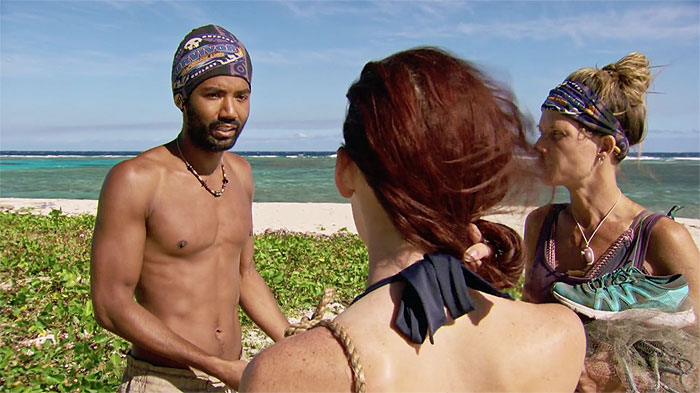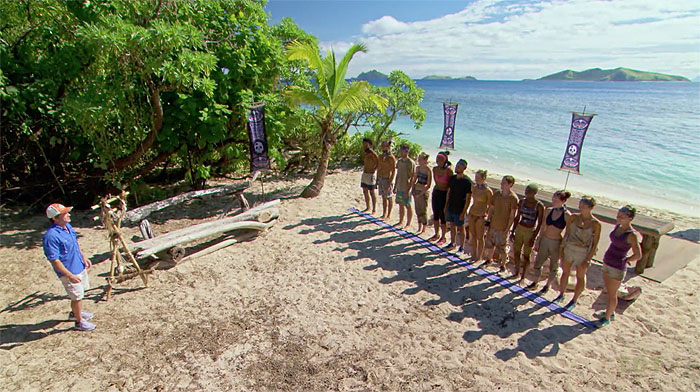

OK, let’s get something out in the open before we even begin to delve into theory: I do not think Angela did anything super exciting this episode. In fact, I don’t even think she had a good week in terms of strategy; she definitely had a good week in terms of eating disgusting stuff, though.
But the strategy she employed last episode is something we often see in Survivor: A contestant runs around camp spreading gossip with the hope it influences what people think about. If you noticed, Angela never told anyone who to vote out; essentially, she never told anybody how to think about something, but rather what to think about.
And that brings us to, literally, the most famous—and more than likely widely used over the years—theory in mass communication research: agenda-setting theory.
I’ve mentioned it many times in this space before, but my field—mass communication—is a relatively new one in academia. Most schools of mass communication or journalism, which incorporates types of strategic communication such as advertising and public relations, began popping up in the early 20th century. And even today, most people in my field actually study media using the theories and methodologies of another discipline. For example, as you all know, I’m essentially a sociologist who happens to study journalism practice. Other folks study media effects through psychological theory and method. And there are many other examples.
What I’m getting at is that this field features very few original theories, ones completely germane to mass communication. But agenda-setting theory is different. It’s relatively recent, hugely influential and from the world of mass comm. Through the seminal work by a couple of University of North Carolina scholars, the theory came to be popular in the early 1970s. But, you know, many people trace the idea back to the great Walter Lippmann.
When people first started studying the effects of media—really newspapers and radio—at the beginning of the 20th century, the first researchers believed that media had direct effects on people. Basically, they sort of believed that if you read something in a newspaper, for example, you’d believe it. Of course, this isn’t true. Hence why agenda setting became so impactful.
The basic, most underlying idea of agenda-setting theory is that the media doesn’t tell us how to think, but what to think about. The early studies basically examined what the media wrote about through an analysis of local newspaper stories, in North Carolina, around the time of an election, but then they also surveyed the people of that local community to find out what issues were most important to them. Essentially, the researchers found that people with all different types of ideologies and opinions had, basically, the same important issues on their mind and, here’s the main thing, those were the same issues the local media discussed most.
Therefore, the media sets the agenda for the pubic, but doesn’t tell them what to feel about the agenda. Obviously, this theory has been updated and complicated numerous times over throughout time and with new technologies.
But the general idea fits with Survivor and, specifically, Angela this week. She knew enough to not run around and tell people how to vote, but by dropping all those comments about Michael, she was attempting to put Michael on everyone’s mind. None of it mattered, but Angela really wanted to enact agenda setting without knowing it.
OK, no more theory. So here’s where I think everyone stands right now:
Lavita

- Jenna: With her top ally now back at Ponderosa enjoying stories about Chris’ greatness and some sick rhymes, Jenna finds herself in an unsettling position. Does she have any real alliances out there? I don’t think so. Besides her mild flirting with SeaBass, we haven’t really seen Jenna make any connections this year… besides with Libby. Not a good thing.
- Angela: So Angela decided to make some “big moves”—notice no caps or trademark symbol—this week. But, in the end, she literally did nothing. Putting a target on Michael, a member of the minority who’s been targeted before? Who cares? While I’m happy Angela seems to be playing the game, her moves this week clearly illustrate she’s not much of a threat.
- Sebastian: Speaking of people who aren’t threats, whatever weed SeaBass smoked before heading to Fiji, he needs to market that stuff quickly. I mean, anything that can deliver a high for, what, 20-something days already would be a big hit, especially here in Colorado.
- Chelsea: I’m going to say a variation of what I said last week: Every week it looks like Chelsea is in the middle of things, making moves. But every week, if you watch closely, she’s really not having much say or impact.
- Donathan: I have to continue admitting something: Donathan really surprised me so far. I’m not surprised he’s lasted this long—well, maybe a little bit—but I’m truly surprised he’s playing such a good game. It really looks like his four-person alliance could be the dominant one in this game.
- Desiree: Well, Desiree got her wish and Libby went home. Does this mean that she’ll start focusing on the big picture now? Desiree’s been in a good position all season long and now is the time for us to see whether she owns the chops to start really playing. In general, I think we’re at the point where, besides Michael, the easy votes are over and some good gaming will happen.
- Domenick: At the beginning of this season, I thought there was no way in hell Domenick had a shot at winning this game. His personality type just doesn’t work in 2018 Survivor. But what I truly give him credit for is early on, he would have been booted for that personality and, since then, he’s dialed it back and played a hell of a game. I still don’t think he wins, but he’s sticking around for now and made quite the mark on this season.
- Michael: I simply can’t separate two aspects of Michael: I think he’s played a really good game so far and simply got unlucky in one vote; if he gives the idol to Brendan, we’re probably seeing a very different season play out. On the other hand, man, he’s seems so boring for an 18-year-old person. Come on, man, have some fun out there.
- Laurel: My Winner Pick™ remains in the game and we’re not seeing any signs of her impending doom. That is amazing. Also, I have to say—knock on wood—I’m optimistic based on the editing: They keep showing Laurel talking about a Big Move™. That gives me hope she’ll make one soon.
- Kellyn: Once again, Kellyn is in the middle of everything and controlling moves in a great, subtle way. You simply have to give her credit. She continues playing a hell of a game.
- Wendell: Another week down, and another week of Wendell receiving, by far, the most obvious Winner’s Edit™ of the season. To be clear, this reminds me so much of Ben in that it would appear Wendell shouldn’t win the season because he’s a huge target that people know about, but the editing just makes you think there is no way he can lose.
And that’s it for another week. Let’s talk again after this coming episode. And let’s hope this season continues its run strong post-merge episodes.
 Pat Ferrucci started watching Survivor when Episode Two of Borneo first aired. He's seen every episode since. Besides recapping here, he'll be live-tweeting this season from the Mountain Time Zone. Why? Because nobody cares about the Mountain Time Zone except when they want to ski. Follow him @patferrucci for Survivor stuff and tweets about anything and everything that enters his feeble mind.
Pat Ferrucci started watching Survivor when Episode Two of Borneo first aired. He's seen every episode since. Besides recapping here, he'll be live-tweeting this season from the Mountain Time Zone. Why? Because nobody cares about the Mountain Time Zone except when they want to ski. Follow him @patferrucci for Survivor stuff and tweets about anything and everything that enters his feeble mind.
- S36 Well, in theory... index
- Cast: Which mistake will I repeat?
- Pre-season: TDT Ghost Island contestant draft
- Eps.1-2: Don't upset the machine, OK?
- Ep.3: How do we attribute that blindside?
- Ep.5: Oh, those disruptive puzzles!
- Ep.6: Voting alone? Different types of social capital
- Ep.7: The annual merge-time power rankings!
- Ep.8: Self-efficacy and the path of least resistance
- Ep.9: What the heck was Angela trying to do?
- Ep.10: How to change someone's mind
- Ep.11: Cognitive dissonance and idle contestants
- Ep.12: The expected utility of not moving
- Ep.13: Who still has a chance to actually win?
- Pre-Ep.14: Jury jeopardy - S36